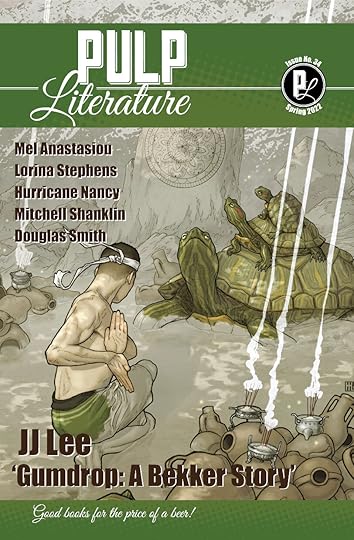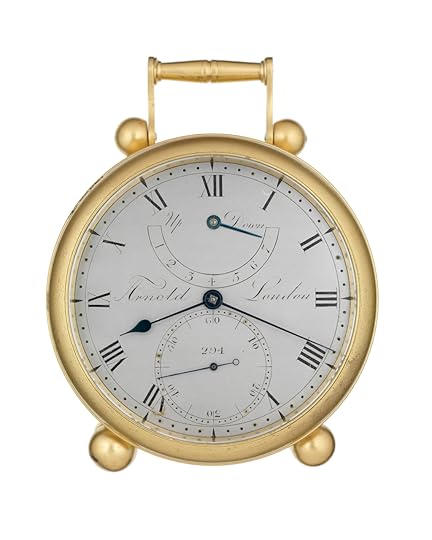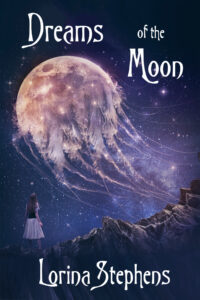Lorina Stephens's Blog, page 7
April 7, 2022
Short story publication

The great folks at Pulp Literature have released their Spring Issue No. 34.
I’m really pleased to share the table of contents with JJ Lee, Megan W Shaw, Kimberley Aslett, Mel Anastasiou, Mitchell Shanklin, Michelle Barker, and Douglas Smith.
My story, Would We Had Time, took inspiration from the true story of a chronometer, inventoried as Arnold 294, and made by the famous John Arnold of London. The chronometer had been assigned to the Erebus of the Franklin Expedition in 1845. And then disappeared with all else on that ill-fated expedition.
 John Arnold
John ArnoldCome forward to 2009. A carriage clock comes to the attention of master horologist Jim Betts of the Royal Observatory in Greenwich, England. Turns out the carriage clock is not a carriage clock at all, but the missing chronometer, Arnold 294, from the doomed and lost Erebus. It is in good condition. And a mystery. No one knows how the chronometer came to survive, or how it came to be disguised and remade into a carriage clock.
 Arnold 294
Arnold 294My story, Would We Had Time, suggests an explanation which I like to think might be worthy of Jack London.
Pulp Literature’s Spring Issue No. 34 is now available through their website in print and ebook. Why not check it out? And leave a review!
March 4, 2022
Review: Galore, by Michael Crummey
 Galore by Michael Crummey
Galore by Michael Crummey
My rating: 4 of 5 stars
Written with Michael Crummey’s highly readable wit and insight, Galore is a rethinking of the story of Jonah and the whale, albeit without the Biblical admonition about destiny. In fact, one might say Crummey refutes the concept of preordination in this family saga rife with pig-headed vengeance, of conversations never opened, of secrets and shames. It is a raw tale, a ridiculous tale, and despite that element of the ridiculous, there is also the ring of truth to the lives Crummey reveals to us.
The language is clever, employing literary devices with a deft hand while keeping the Newfoundland dialect intact. The characters he sketches are fully-realized, and although their lives are beset with the incredible, they are also quite believable. It has always been an amazement to me how Crummey does that: creates extraordinary characters who are believable and accessible.
Definitely going on my shelves in hardcover.
February 25, 2022
Review: Kitchen Confidential, by Anthony Bourdain
 Kitchen Confidential: Adventures in the Culinary Underbelly by Anthony Bourdain
Kitchen Confidential: Adventures in the Culinary Underbelly by Anthony Bourdain
My rating: 3 of 5 stars
Once again I find myself flying in the face of popular sentiment. Somehow I feel I should have gone with public acceptance of Bourdain’s very raw, even visceral, autobiographical journey as a chef, and as an individual.
His culinary autobiography is well-written, much to the credit of his ghost writer, and so I cannot give any honest evaluation of his skill as a writer.
What he relates is another matter. His angry, bad-boy delivery has more to do with his own dissolute and reckless lifestyle than it does about any culinary achievement. Could he make his way around the professional kitchen? Apparently he could. Did he leave a legacy? Indeed he did, by way of many supportive and charitable acts. However, any of the considerable good he fostered throughout his life is not reflected in in this particular publication. Which is unfortunate.
The take-away (forgive the pun) from this book? Fuck everything because tomorrow doesn’t matter. What matters is being the Mad Max hero, punching as much braggadocio and sensation as possible into each moment. Perhaps, in a way, what he was really saying was that from puberty to his suicide at the age of 61, he was chasing death. And that’s a very sad thing, because in his pursuit of interesting food from the common people of the world, he illuminated the importance of the fundamental act of food preparation as a social construct.
Should you read this book? Probably. Especially if you had been a fan of his work. It is a naked insight.
February 18, 2022
Another 5-star review for Dreams of the Moon

Fellow author, Michèle Laframboise, reviewed my collection of fantastica short stories, Dreams of the Moon. I am quite amazed. Here’s her review.
To read Dreams of the Moon is like to look at a generous buffet with lots of delicacies to choose from. None of the stories are copies of each other, or even in the same genre, they run the gamut of dark fantastic (the titular story) and science-fiction, progressing from the darker tales to the more hopeful.
I was specially touched by “Intersection” set in Toronto, with a very (apparently) simple problem to solve. Crossing a wide street; how difficult can it be? The answer : veeery difficult when you’re an autistic. The story seamlessly mixes SF and mental health.
But I also discovered the woes of being an immortal with people passing through your life, or trying to reconnect with your dead daughter in the subway, or celebrating family in the far space…
Lorina’s buffet is full of strange encounters, like a grizzly casually drinking Coke from your fridge and philosophing. Bon appétit!
*****
Le recueil de nouvelles de Lorina Stephens, Dreams of the Moon réunit des récits fantastiques et attachants en un buffet varié et appétissant.
Mon histoire favorite était Intersection, qui se déroule à Toronto. Qui aurait dit que traverser Bay Street pouvait être si difficile pour une angoissée? Heureusement, la technologie et un frère aimant peuvent aider. Un touche délicate sur la santé mentale.
And while you’re shopping for a copy of Dreams of the Moon, you might also want to check out Michèle’s work.
February 8, 2022
Editorial Services
Over the years I’ve been asked to provide editorial services quite outside of Five Rivers Publishing, and it’s been my pleasure to do so.
So, now I’m making if official: I’m offering professional editorial services.
What does that mean?Whether you’re looking for an editor to help you with the development and structure of your novel or book, or copy-editing services, I’d be pleased to offer you the benefit of 40 years of experience in the publishing industry as a writer, journalist, editor, and publisher.
My rates run at $50.00 per hour. An average manuscript of about 80,000 words usually takes about 40 hours for a developmental edit, less for a copy-edit.
If you’re interested, email me a query outlining your needs, and from there we can discuss how to proceed.
January 25, 2022
An explanation regarding my reviews
During a recent discussion with colleagues, a rating for a recent review I’d done was met with surprise. How could I not have given five stars to a novel I had, in fact, very much enjoyed?
Allow me to explainIt occurred to me my rating system is quite different from that of my colleagues’. They rate according to emotional response, which is quite fine.
However, for me, when I’m reading whether for pleasure or for research, I’m always analyzing what I’m reading, not just the content, but how that content has been put together and presented. So, allow me to elaborate for you what my colleagues and I discussed the other evening.
Five starsGenerally, this is a rare rating I accord, although I do admit I don’t always adhere to what follows. For me, a work of literature rates five stars if, in my opinion, there has been a demonstration of the apex of literary skill, and that skill is not bound by genre, rather solely upon artistic merit and craft. And such a high rating also means that I feel that work may very well stand the test of time and become a classic work in generations to come. It also means that work will likely find its way as a print book into my library.
Now, unfortunately, some of my colleagues think I refer only to works which are accorded those grand and enviable literary awards, works which, according to some, are coma-inducing pages of pretension. Not so. Might I point out works which are today considered classic works very often were written either for mass consumption, rife with bawdy humour and political jibes (Shakespeare), or serialized and gobbled up through newspapers by readers interested in the plight of the working class (Dickens), or considered romantic drivel (Bronte sisters and Jane Austen), or ridiculous speculation (Mary Shelley).
So, I accord five stars for works which craft with excellence not only the nuances of language, but characterization, plot, research, and literary devices. Five stars means there were moments I paused, stunned by a phrase, a passage which transported and amazed. It means that for days, weeks, and sometimes years later I still think about those characters, those situations, and can still be moved. Five stars means I have been so affected, that what the author has achieved is a profound communication. To me, that’s what constitutes classical literature. And that’s what merits five stars. I know, sounds awfully boring and pretentious, right?
Ten of the works I’ve rated five stars:
The Back of the Turtle, by Thomas KingBlack Wine, by Candas Jane DorseyThe Blind Assassin, by Margaret AtwoodThe Orenda, by Joseph BoydenThe Innocents, by Michael CrummeyThe Left Hand of Darkness, by Ursula K. Le GuinA Fine Balance, by Rohinton MistryThe King’s Last Song, by Geoff RymanWuthering Heights, by Emily BronteJude the Obscure, by Thomas HardyFour starsIs all of the above, but didn’t quite make that level of profundity. It means that work may very well go on to be read generations from now, appreciated, studied, (and in some cases has) but is the silver medal instead of the gold.
Ten of the works I’ve rated four stars:
The House of Niccolo series, by Dorothy DunnettA Telling of Stars, by Caitlin SweetThe Sea Wolf, by Jack LondonThe Steel Seraglio, by Mike CareyThe Broken Earth Trilogy, by N.K. JemisinKraken Bake, Karen DudleyTrickster Trilogy, by Eden RobinsonThe Morgaine Chronicles, by C.J. CherryhThe Mayor of Casterbridge, by Thomas HardyMercy Among the Children, by David Adams RichardsThree starsI reserve a three star rating for a good piece of writing which has been entertaining and engaging, quite interesting, but not a work which makes a profound statement, or a work which I found somehow flawed, not quite there. This is, of course, quite subjective. There are many works in this category which are definitely a good read, something to sweep the reader away. A few of my three star ratings:
The Book of Secrets, by M.G. VassanjiYsabel, by Guy Gavriel KayThe Chronicles of Thomas Covenant, the Unbeliever, by Stephen R. DonaldsonConceit, by Mary NovickKeeper’n Me, by Richard WagameseIn the Skin of a Lion, by Michael OndaatjeAlways Coming Home, by Ursula K. Le GuinA Prayer for Owen Meany, by John IrvingThe House of Medici: Its Rise and Fall, by Christopher HibbertA Portrait of the Artist as a Young Man, b James JoyceTwo starsTwo stars is a rating I’m careful about according, because I have to separate personal bias regarding subject matter from the strictures of good writers’ craft. I do try very hard not to be too subjective about this. Equally, I’m painfully aware that art is entirely subjective. So, what rates two stars, for me, is a work which not only has been rife with exposition, pretension, plot flaws which are more like gaping holes, plausibility, character motivation, and thus and so. Two star books are ones which I am highly unlikely to ever read again, and yes indeed I do re-read books, some every few years. It’s like returning to an old friend. Two star books, however, are ones to pass on to someone else who may, or may not, appreciate them. Call two stars an amicable divorce.
Mary, Called Magdalene, by Margaret GeorgeThe New Moon’s Arms, by Nalo HopkinsonMaelstrom, by Peter WattsThe Warrior Who Carried Life, by Geoff RymanBodily Harm, by Margaret AtwoodMemoirs of a Geisha, by Arthur GoldenTreason, by Orson Scott CardThe Dragon’s Eye, by Joël ChampetierThe Eyes of Heisenberg, by Frank HerbertThe Golden Mean, by Annabel LyonThe Difficult and dreaded one starOne star usually means I couldn’t give the work zero stars. It often means I probably shouldn’t have reviewed it at all, just should have kept my great, almighty mouth shut and be done with it. But no, Lorina always has to wade in and pontificate, often to her chagrin and detriment. So, one star means I had a visceral dislike for the subject matter, the questionable research or author familiarity with the subject, how the piece was written, the viewpoints presented, and thus and so.
The Shipping News, by Annie ProulxHow to See Yourself as You Really Are, by the Dalai LamaThe Way of All Flesh, by Samuel ButlerHis Dark Materials, by Philip PullmanPilgrim at Tinker Creek, by Annie DillardThe Historian, by Elizabeth KostovaThe Twilight Saga, by Stephenie MeyerThe 100-Year-Old Man Who Climbed Out the Window and Disappeared, by Jonas JonassonAt the Mountains of Madness, by H.P. LovecraftAdult Onset, by Ann-Marie MacDonaldAny wiser?Probably not. It’s not like my reviews actually matter. It’s not like I’m a respected and followed influencer. I’m just one writer, one reader, one person, who loves art and literature and sharing ideas.
So, go forth. Read. Analyze. Write your own reviews. Discuss them and other reviews. Allow your opinion to be modified. And just keep reading.
January 19, 2022
Review: The Kite Runner, by Khaled Hosseini
 The Kite Runner by Khaled Hosseini
The Kite Runner by Khaled Hosseini
My rating: 4 of 5 stars
The Kite Runner is my introduction to Khaled Hosseini, and it’s a good one.
The tale Hosseini weaves is one of sorrow and redemption, primarily set in his native Afghanistan during the fall of the monarchy and the rise of Soviet invasion. Against this backdrop Hosseini creates a relationship between a privileged boy, Amir, in the Wazir Akbar Khan district of Kabul, and the boy, Hassan, who lives as the son of a trusted servant/friend of Amir’s father.
Hosseini is an accomplished writer who creates a complex story of violence, betrayal, broken trust, of the labyrinth of familial relationships, of secrets created to protect and which ultimately fail. It is a history of tribal fighting and destructive discrimination. It is a story of failure, of guilt, and in the end, redemption which may leave you weeping. It did me.
And through all this is the theme of competitive kite flying, of glass-imbedded thread which can slice fingers to ribbons. It is a clever and sobering metaphor for innocence in the face of violence.
This is one of those rare books I will procure in hardcover to have a place on my library shelves, a book I will return to again and again as I do with anything by classical writers like Hardy and Conrad. I think you may find The Kite Runner unforgettable.
January 15, 2022
Review: A Brief History of Iceland, by Gunnar Karlsson
 A Brief History of Iceland by Gunnar Karlsson
A Brief History of Iceland by Gunnar Karlsson
My rating: 3 of 5 stars
If nothing else, Gunnar Karlsson’s title for his history of Iceland is accurate. It is definitely a brief history. Something like an amuse-bouche.
It’s well-written, albeit dry, focusing more on mid-19th century to relative present day. There is brief reference to its indigenous and Viking roots, referring more to the advent of Christianity and more modern political structure.
Still, a quick overview for anyone just interested in appetizers.
January 12, 2022
Sometimes David needs to pay Goliath
For some number of years it has been well-known among indie presses who use Ingram to set up their print-on-demand titles that Amazon, that retailing mammoth, would never play fair. Fair isn’t how you amass billions of dollars in wealth. What the giant would do is accept Ingram’s data feeds so that your title would appear on Amazon’s website, and then within a few weeks the titles would be listed as unavailable from Amazon, and could only be purchased through third party sellers. Those third party sellers would then usually charge double your suggested retail, and you’d be left out in the nether-hells of publishing limbo.
Why employ such a practice?That’s quite simple. Amazon developed its own print on demand publishing platform which works in tandem with their ebook platform, and yes with their audiobook platform (ACX, which in turn is also Audible). So, in order to drive small presses to Amazon’s printing platform, they employed the tactics I described above. Publishing your work through Amazon then guaranteed your books would be listed as in stock, available for Prime Member free shipping, and at the retail price you set rather than some inflated price from a third party seller.
Now, for a very long time small presses tried gaming Amazon’s system by changing their prices at Ingram, which would initiate a new data feed, and indeed for a very short while, perhaps a week, not much longer, your books would suddenly be in stock and available at the price you set. And then the logarithms would activate again, and you’d be freezing your publishing ass off in that special hell.
You can stand on principles only so long… before you freeze. So, finding myself really pretty cold, one might say frozen, indeed glacial, I’ve capitulated to the giant. All my books are now also printed through Amazon’s KDP platform, although I refrained from giving the giant exclusivity. And immediately my books are listed as in stock, at the price I set, and available for free shipping to Prime members. I’m hoping that situation remains true. I hope the giant won’t further squeeze we wee mice and force us into exclusive distribution.
Shop to your heart’s contentSo, now you can shop to your heart’s content at Amazon, purchase any of my books at a reasonable price, get that free shipping if you’re a Prime member. And to further help you on your reading path, I’ve put links to all my books on each page. There’s no excuse now. Go forth. Buy books. Read. Enjoy.
January 10, 2022
Review: The Centaur’s Wife, by Amanda Leduc
 The Centaur’s Wife by Amanda Leduc
The Centaur’s Wife by Amanda Leduc
My rating: 3 of 5 stars
If you’re looking for a post-apocalyptic, nature-takes-revenge on humans, with a fantasy overlay novel which represents disability rights, then The Centaur’s Wife is your ticket.
Amanda Leduc presents a dark, relentless story in which a group of survivors takes refuge in the remains of a city which sits at the foot of a mystical mountain. And the mountain is in turn the refuge of centaurs.
The story is complex, well-written, certainly interesting. But there were times I felt Leduc was trying too hard, trying to fit too many concepts into one novel. I’m in the minority here, I realize, which is not uncommon in itself. There was the apocalypse itself, which was never really clearly defined, just that there had been some sort of meteor event, or some such. There was the violent rebellion of the plant world which set about devouring and assimilating any remaining humans. There was the racism regarding centaurs. There was the protagonist’s disability in the form of a leg which has become malformed. And there was the ancient backstory of a shattered love, and cross-species children become centaurs.
I’m afraid, however, my willingness to suspend disbelief and accept the convoluted world Leduc created ended when the human female protagonist has sex with the centaur male protagonist. Yup. I’m reading this thinking: how does that work? I know: things we shouldn’t think about. But I couldn’t help it. And right there, in that scene near the denouement, simply ended it for me. Not because of some sense of delicacy, but rather from plausibility. Seriously: how does that work?
Now, I know there are myriad legends about human congress with animals, right from the famous story of the minotaur to Leduc’s centaur riding woman. (Forgive the play on words.) But even so….
And in the end, there is much ambiguity, despair, and further darkness, an implacable sort of futility which is well-written, very emotive.
You should probably read The Centaur’s Wife and make up your own mind.



